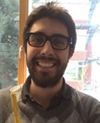 Juan Orduz,
Juan Orduz,
BMS Phase II Student,
Qualifying Exam BMS, MSc Humboldt-Universität zu Berlin,
BSc Universidad de los Andes Bogotá
In the fall of 2010, after completing my bachelor's degrees (Physics and Mathematics) at Universidad de los Andes (Bogotá, Colombia), I applied for the Phase I program of the Berlin Mathematical School. Fortunately, I was invited to an interview in February 2011 for the BMS Days, where I had the chance to talk to some professors and students. The structure of the program combined with the unique energy of Berlin made me choose the BMS to continue with my math studies. Today, almost five years later, I am happy to say that this was the best choice for me!
Let us begin with the program itself. First I want to mention one of the major qualities of this program: the BMS office with its amazing staff. They are always there to help and their guidance really makes life easier! Among many activities that they organize, I just want to mention the variety of soft skill seminars and German language courses.
Now I continue by describing the program through my experience. During my first year in Berlin, I took several courses in different areas of mathematics, since I wanted to strengthen my mathematical knowledge in a wide range. Sometimes, it was not easy to choose the courses because of the extensive amount of courses that the three universities offered (this was actually great!). During my second year, I had the fortune to attend an Advanced Course covering some topics around the Atiyah-Singer Index Theorem given by Prof. Dr. Jochen Brüning, who would later become my PhD advisor.
The first step towards the PhD program was to pass the BMS Qualifying Exam. As the core topic of this exam, we chose a book on geometric analysis which was the cornerstone of the (prospective) PhD project. I was also evaluated in algebraic topology, a topic not "directly connected" with the contents of the mentioned book. After this exam, I wrote a master's thesis about the concrete fundamentals of the already given dissertation project. This was extremely helpful because after completing the Phase I program, I felt that I was in a position to tackle the real problem.
During Phase II, I have been focusing on my research project. To complement this, I have had the chance to attend remarkable conferences and summer schools in various cities around the world. I have also met great researchers to discuss with and get some feedback. Berlin is really an important location where there is a big flow of PhD students, postdocs and professors, so it is easy to interchange ideas with other mathematicians.
Furthermore, in my first year as a Phase II student, I had the privilege of being a BMS student representative. In a team of four other students, we witnessed how hard the BMS office worked to make the program run smoothly. By organizing events and attending some committees, we did our best to help and contribute to it. In particular, we organized the 3rd BMS Student Conference, which brings together BMS students to present their research or interests in mathematics.
Now, let me mention some things about the city of Berlin. It is an amazing city to live in! Especially for students, because of all the benefits that we get. In Berlin you cannot get bored, there are activities for each taste. It is a perfect city to balance academic life and personal interests. It is a city full of history and contrasts. Even though one can survive with English, learning German is another advantage of living in Berlin. It requires some time, but I think that learning German is a great way to learn about the culture and the city itself. I could keep writing about how great this city is, but I think it is better if you discover it yourselves.
Last, but not least, I want to add that during my stay in Berlin, I have met really great people from different cultures all around the world! It is not easy to express how much I have learned from them!
Published in September 2016
Update 2018: Juan works as a data scientist in Berlin.






















